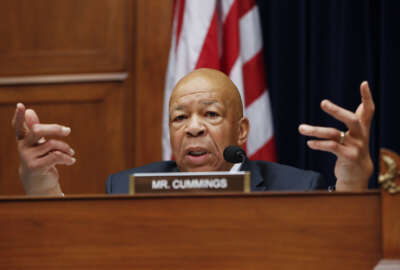
House oversight committee approves ‘ban the box’ bill for agencies, contractors
The House Oversight and Reform Committee passed a bipartisan bill Tuesday that would “ban the box” and prohibit federal agencies and contractors from asking...
The House Oversight and Reform Committee, through a voice vote Tuesday, passed a bipartisan bill that would “ban the box” and prohibit federal agencies and contractors from asking job applicants about their criminal history until after they’ve made a conditional employment offer.
Committee chairman Elijah Cummings (D-Md.) said the Fair Chance Act, if passed, would give “formerly incarcerated people a fair chance at a job.”
The bill marks the latest efforts over the past few years to strengthen efforts made under the Obama administration to prevent a criminal history from disqualifying applicants from federal employment.
The Office of Personnel Mangement in 2016 finalized a rule change that would delay questions about criminal history until the later stages of the federal hiring process.
“While most agencies already have taken this step, this action will better ensure that applicants from all segments of society, including those with prior criminal histories, receive a fair opportunity to compete for federal employment,” former acting OPM director Beth Cobert wrote in a blog post.
Cummings and House Judiciary Committee ranking member Doug Collins (R-Ga.) introduced the legislation on Feb. 7, while Sens. Cory Booker (D-N.J.) and Ron Johnson (R-Wis.) introduced companion legislation.
The Senate Homeland Security and Governmental Affairs Committee approved the bill on March 13.
However, Rep. Chip Roy (R-Texas) argued the bill would “place further burdens and restrictions” on the federal hiring process, and introduced two amendments the committee rejected.
Related Stories

House oversight committee approves ‘ban the box’ bill for agencies, contractors
One amendment would’ve given every cabinet secretary the authority to “reward good federal employees and to remove poor performers more quickly.” A second amendment would’ve exempted federal contractors from the bill.
“Federal workers who are not accountable to success in their jobs tend to make the government less efficient. It should not be burdensome to remove any employee that is not meeting the standards of work in the federal government, just as we do in the private sector,” Roy said.
The language of Roy’s amendment echoes provisions in three executive orders President Donald Trump signed last May. However, a district court judge in August overturned nine major provisions in those executive orders. The administration is currently appealing that decision.
Committee ranking member Jim Jordan (R-Ohio) has requested the Government Accountability Office pursue a study of this policy before it advances in Congress. Roy said he supported the GAO review.
“We’re in a unique position that we could know if a law works before we pass it, so why not wait until we know the outcome of what’s already impacting federal law?” Roy asked.
Cummings said Johnson’s staff has worked closely with the federal contracting community to “ensure any compliance burden created by this bill would be limited.”
The committee also rejected an amendment from Rep. Carol Miller (R-W.V.) that would limit liability for contractors who are required to comply with the “ban the box” hiring practices in order to compete for federal contracts.
“Private employers should not have to take on increased liability to be in compliance with the Fair Chance Act,” Miller said.
Bill aims to keep IG offices ‘adequately staffed’
The committee also approved a bill that would require the president to provide an explanation to Congress for inspector general vacancies lasting longer than 210 days, and provide lawmakers with a target date of when the administration expects to submit a nomination for those watchdog posts.
The Inspector General Protection Act would also require the president to notify Congress when an inspector general is placed on unpaid or administrative leave, or otherwise changes status.
There are currently a dozen IG vacancies. One of those agencies, the Interior Department, hasn’t had a permanent IG since 2009.
Reps. Jody Hice (R-Ga.) and Ted Lieu (D-Calif) introduced the bill last Thursday.
“Inspectors general are indispensable to Congress, and by ensuring the federal government is adequately staffed with inspectors general, we are reaffirming our commitment to rooting out government fraud, waste and abuse,” Hice said.
Rep. Jimmy Gomez (D-Calif.) withdrew an amendment that would require an agency’s principal assistant secretary, or a career member of the Senior Executive Service, to assume the role of acting IG in the event of a vacancy.
Rep. Mark Meadows (R-N.C.) said the amendment would “defeat the purpose” of having an independent agency watchdog.
“When you look at SES employees, you essentially are elevating somebody to become IG in an acting basis that may oversee the very person that has perpetrated a problem within the agency,” he said.
GAO reported last March that between 2007 and 2016, 53 of the 64 IG offices covered by the Inspector General Act had experienced one or more vacancy periods lasting between two weeks and six years.
Lawmakers aim to give OGE ‘real teeth and real muscle’
The committee, for a second time, also approved the Comprehensive Ethics Enforcement Act.
The bill was previously introduced in H.R. 1, or the For the People Act, which also included automatic voting registration and campaign finance reform provisions.
The bill, if passed, would strengthen OGE’s independence, only allowing removal of the director for “inefficiency, neglect of duty, or malfeasance in office.” The bill would also allow OGE directors to continue to serve up to a year past their five-year term until a successor has been appointed.
Rep. Jamie Raskin (D-Md.), the bill’s original sponsor, said the bill would give OGE “real teeth and real muscle.”
Former OGE director Walter Shaub, at a committee hearing on H.R. 1 last month, said the agency “lacks real enforcement authority” beyond its power to make recommendations.
Copyright © 2024 Federal News Network. All rights reserved. This website is not intended for users located within the European Economic Area.
Jory Heckman is a reporter at Federal News Network covering U.S. Postal Service, IRS, big data and technology issues.
Follow @jheckmanWFED




